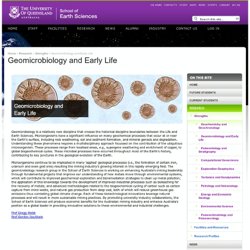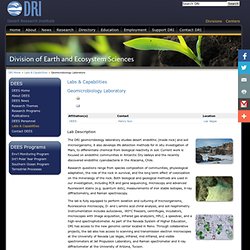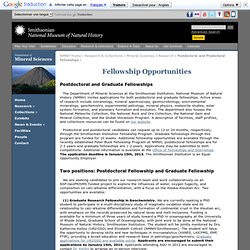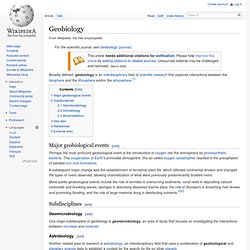

Michigan Geomicrobiology Lab - Gregory Dick. Michigan Geomicrobiology Lab - Gregory Dick. Geomicrobiology LABORATORY @ Delaware. Welcome to Matt Schrenk Geomicrobiology Lab. Home. Geomicrobiology research group - Home. AIST Geomicrobiology Research Group. ESS Research Group - Geomicrobiology. The field of geomicrobiology concerns the role of microbe and microbial processes in geological and geochemical processes. The field is especially important when dealing with microorganisms in aquifers and public drinking water supplies. Another area of investigation in geomicrobiology is the study of extremophile organisms, the microorganisms that thrive in environments normally considered hostile. Such environments may include extremely hot (hot springs or mid-ocean ridge black smoker) environments, extremely saline environments, or even space environments such as Martian soil or comets.
Geomicrobiology and Early Life. Geomicrobiology is a relatively new discipline that crosses the historical discipline boundaries between the Life and Earth Sciences.

Microorganisms have a significant influence on many geochemical processes that occur at or near the Earth's surface, including rock weathering, soil and sediment formation, and mineral genesis and degradation. Understanding these phenomena requires a multidisciplinary approach focussed on the contribution of the ubiquitous microorganism. These processes range from localised areas, e.g., supergene weathering and enrichment of copper, to global biogeochemical cycles. These microbial processes have occurred throughout most of the Earth’s history, contributing to key junctures in the geological evolution of the Earth. Microorganisms continue to be implicated in many ‘applied’ geological processes (i.e., the formation of certain iron, uranium and even gold ores) resulting the mining industry’s growing interest in this rapidly emerging field.
Geomicrobiology Laboratory. The DRI geomicrobiology laboratory studies desert endolithic (inside rock) and soil microorganisms; it also develops life detection methods for in situ investigation of Mars, to differentiate chemical from biological reactivity in soil.

Current work is focused on endolithic communities in Antarctic Dry Valleys and the recently discovered endolithic cyanobacteria in the Atacama, Chile. Research questions range from species composition of communities, physiological adaptation, the role of the rock in survival, and the long term effect of colonization on the mineralogy of the rock. Both biological and geological methods are used in our investigation, including PCR and gene sequencing, microscopy and advanced fluorescent stains (e.g. quantum dots), measurements of iron stable isotopes, X-ray diffractometry, and Raman spectroscopy.
Geomicrobiology Group - Kochi Institute for Core Sample Research, JAMSTEC. Sean Loyd's Webpage. Bailey Geobiology Lab, University of Minnesota. Fellowships - Department of Mineral Science. The Department of Mineral Sciences at the Smithsonian Institution, National Museum of Natural History (NMNH) invites applications for both postdoctoral and graduate fellowships.

Active areas of research include volcanology, mineral spectroscopy, geomicrobiology, environmental mineralogy, geochemistry, experimental petrology, mineral physics, meteorite studies, solar system formation, and planetary formation and evolution. The department also houses the National Meteorite Collection, the National Rock and Ore Collection, the National Gem and Mineral Collection, and the Global Volcanism Program. A description of facilities, staff profiles, and collections resources can be found on our website. Predoctoral and postdoctoral candidates can request up to 12 or 24 months, respectively, through the Smithsonian Institution Fellowship Program.
Graduate fellowships through this program are funded for 10 weeks. . (1) Graduate Research Fellowship in Geochemistry. Aradhna Tripati. Geobiology. Broadly defined, geobiology is an interdisciplinary field of scientific research that explores interactions between the biosphere and the lithosphere and/or the atmosphere.[1] Major geobiological events[edit] Perhaps the most profound geobiological event is the introduction of oxygen into the atmosphere by photosynthetic bacteria.

This oxygenation of Earth's primoidial atmosphere (the so-called oxygen catastrophe) resulted in the precipitation of banded-iron rock formations. A subsequent major change was the establishment of terrestrial plant life, which affected continental erosion and changed the types of rivers observed, allowing channelization of what were previously predominantly braided rivers.
Subdisciplines[edit] Geomicrobiology[edit] Research - Moreau Geomicrobiology Lab. Penn State Geosciences > Geomicrobiology Lab.